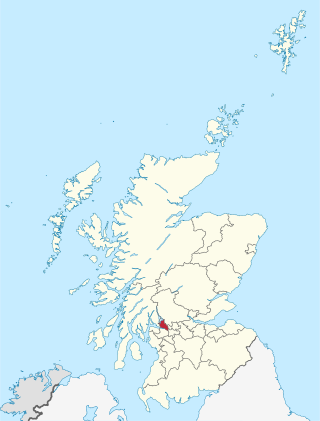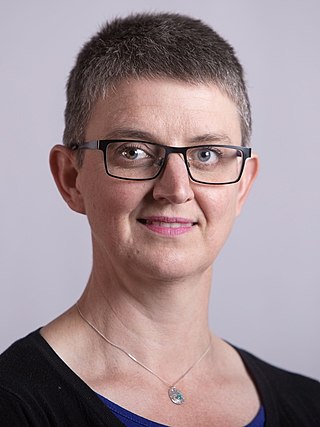
Aberdeen City Council is the local government authority for the city of Aberdeen, Scotland. It was created in 1996, under the Local Government etc. (Scotland) Act 1994, though a sense of Aberdeen as a city, with its own city council, can be traced back to 1900, when the county of the city of Aberdeen was created.

West Dunbartonshire is one of the 32 local government council areas of Scotland. The area lies to the north-west of the Glasgow City council area and contains many of Glasgow's commuter towns and villages. West Dunbartonshire also borders Argyll and Bute, East Dunbartonshire, Renfrewshire and Stirling.

Renfrewshire is one of the 32 council areas of Scotland.

Aberdeen South is a burgh constituency of the House of Commons of the Parliament of the United Kingdom and it elects one Member of Parliament (MP) by the first-past-the-post system of election.
In the context of local authorities in the United Kingdom, no overall control is a situation in which no single political group achieves a majority of seats, analogous to a hung parliament. Of the 248 councils who had members up for election in the 2019 local elections, 73 resulted in a NOC administration. In the 2021 election, 14 resulted in no overall control. The term can still be used for several other countries, such as for two local councils of Malta and the General Assembly of Budapest in Hungary.

Kathryn Sloan Clark, Baroness Clark of Kilwinning, is a British politician and life peer who has served as a member of the Scottish Parliament (MSP) for the West Scotland region since 2021. A member of the Labour Party, she was Member of Parliament (MP) for North Ayrshire and Arran from 2005 to 2015.

West Ham was a local government district in the extreme south west of Essex from 1886 to 1965, forming part of the built-up area of London, although outside the County of London. It was immediately north of the River Thames and east of the River Lea.

The first elections to the new local authorities established by the Local Government Act 1972 in England and Wales and the new Northern Ireland district councils created by the Local Government Act 1972 took place in 1973. Elections to the existing Greater London Council also took place.

Politics in the Dundee Citycouncil area are evident in the deliberations and decisions of Dundee City Council, in elections to the council, and in elections to the Scottish Parliament (Holyrood) and the House of Commons of the Parliament of the United Kingdom (Westminster).

The 2007 Scottish local elections were held on 3 May 2007, the same day as Scottish Parliament elections and local elections in parts of England. All 32 Scottish councils had all their seats up for election – all Scottish councils are unitary authorities.
The British left can refer to multiple concepts. It is sometimes used a shorthand for groups aligned with the Labour Party. It can also refer to other individuals, groups and political parties that have sought egalitarian changes in the economic, political, and cultural institutions of the United Kingdom. There are various subgroups, split between reformist and revolutionary viewpoints. Liberals, progressives and social democrats believe that equality can be accommodated into existing capitalist structures, but they differ in their criticism of capitalism and on the extent of reform and the welfare state. Anarchists, communists, and socialists, among others on the far left, on the other hand argue for abolition of the capitalist system.

Trade Unionist and Socialist Coalition (TUSC) is a socialist electoral alliance in Britain. It was originally launched for the 2010 general election.
The politics of Glasgow, Scotland's largest city by population, are expressed in the deliberations and decisions of Glasgow City Council, in elections to the council, the Scottish Parliament and the UK Parliament.

The Socialist Labour Party (SLP) is a socialist political party in the United Kingdom. The party was established in 1996 and is led by Arthur Scargill, a former Labour Party member and the former leader of the National Union of Mineworkers. The party's name highlights its commitment to socialism and acknowledges Clause IV of the Labour Party's former constitution, as fundamental to the party's identity.

Maggie Chapman is a Scottish politician and lecturer who is a Scottish Green Member of the Scottish Parliament (MSP) for North East Scotland. She was co-convenor of the Scottish Greens from November 2013 to August 2019, serving with Patrick Harvie, and was the party's lead candidate for the 2019 European election.

The Scottish Socialist Party is a left-wing political party campaigning for the establishment of an independent socialist Scottish republic.

Mary Bell (1885–1943) was a Scottish politician, one of the first Scottish women to be elected as a local councillor, and the first female senior magistrate of the city of Glasgow.

Elections to Aberdeen City Council took place on 5 May 2022 on the same day as the 31 other Scottish local government elections. As with other Scottish council elections, it was held using single transferable vote (STV) – a form of proportional representation – in which multiple candidates are elected in each ward and voters rank candidates in order of preference.

An election to the Aberdeen Corporation was held on 3 November 1908, alongside municipal elections across Scotland. 11 of the corporation's 34 seats were up for election, although only 3 were contested.















